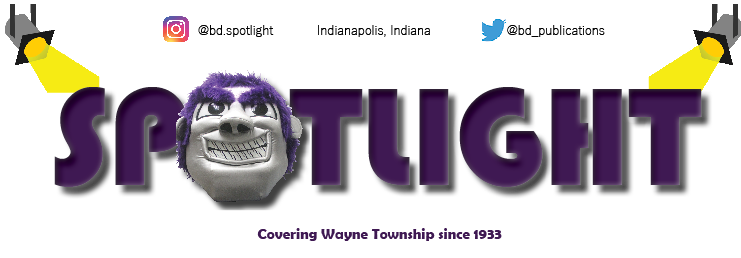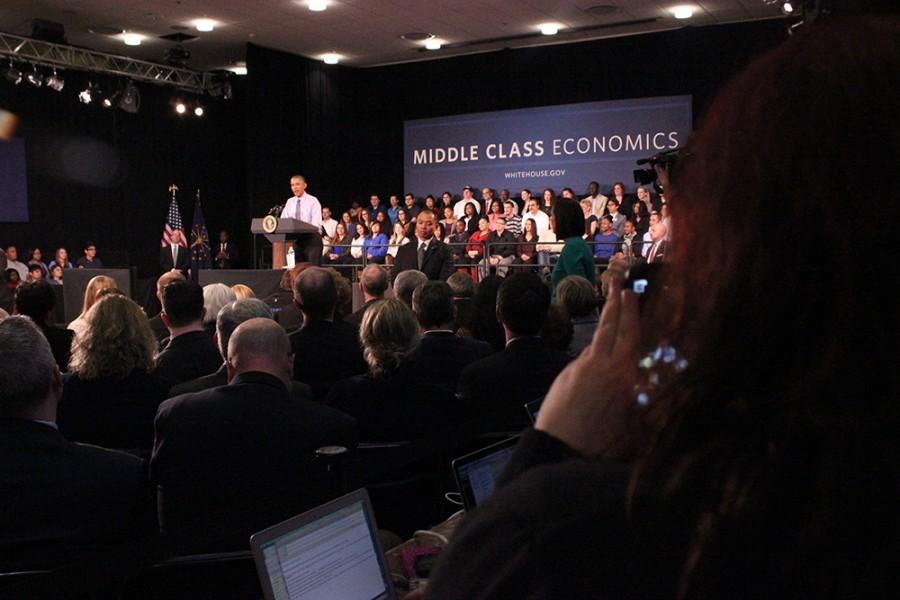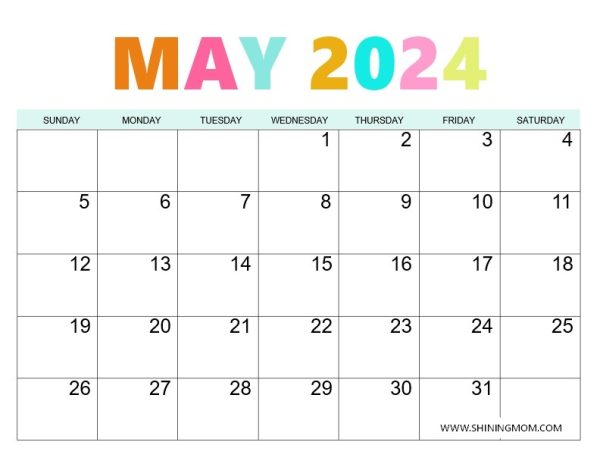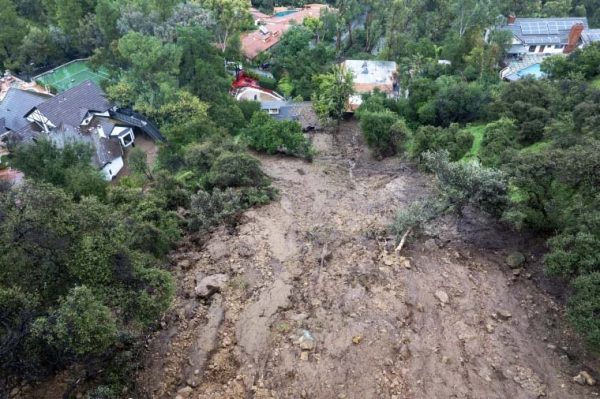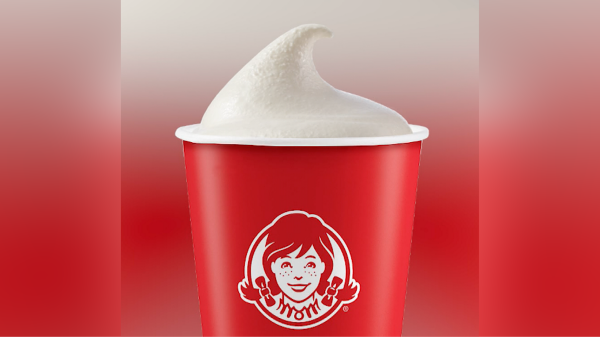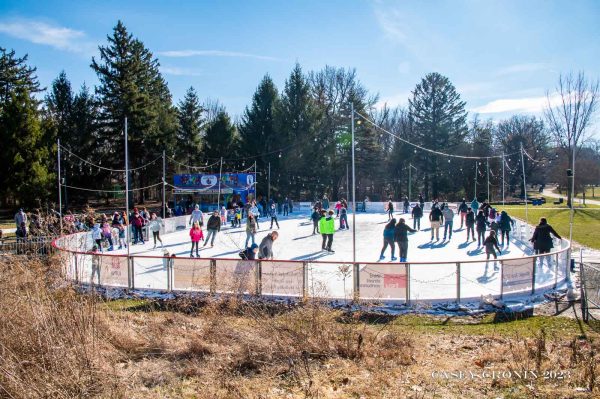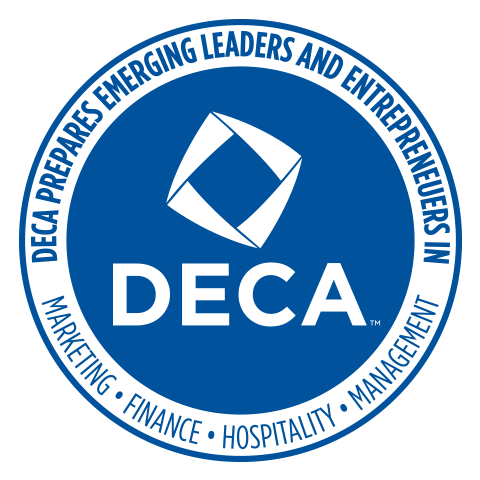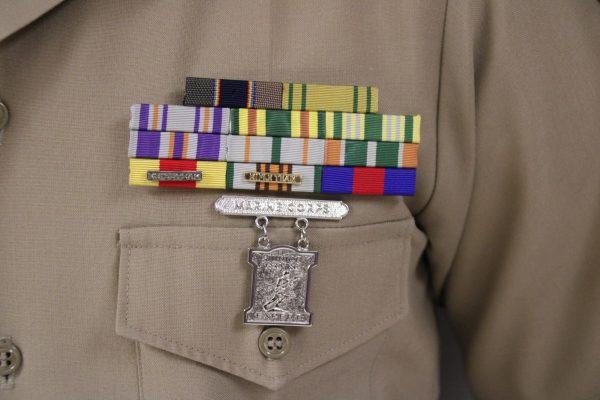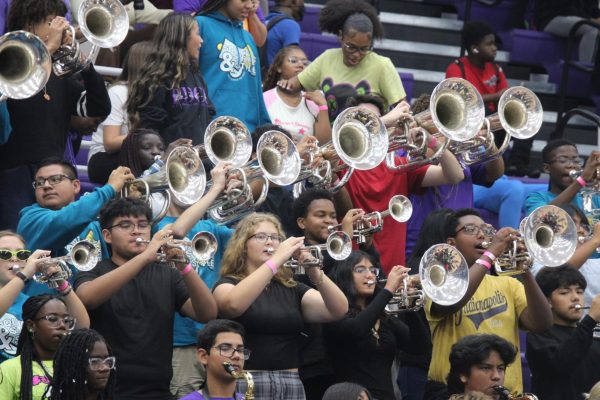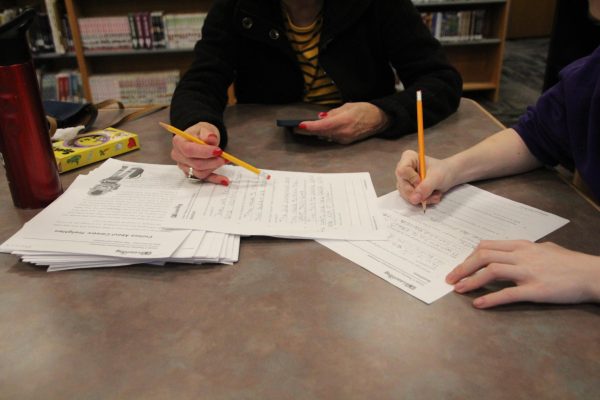Reporting live
The President’s speech through the eyes of a broadcaster
Middle Class Economics was the backdrop of Friday’s town hall meeting at Ivy Tech with President Barack Obama.
Editor’s note: Senior Breanna Cooper is editor of the Spotlight and also a member of WBDG radio. She covered Friday’s presidential visit to Indianapolis along with Spotlight photographer Lacey McLaughlin and Spotlight news editor Brittany Baker. Her account of the day follows.
Walking towards Ivy Tech Community College, the anticipation of what I was about to take part in distracted me from the bitter cold. As an aspiring reporter, the idea of sitting in a press booth as the President of the United States addressed a crowd was almost overwhelming.
As the Ben Davis media crew stood in line to be checked in, I took in my surroundings. News trucks were parked all along the sidewalk, anchors prepared to record their reports, and the security line was moving much quicker than I expected. It wasn’t until I was signed in and given a press pass that reality truly hit home: I had been given the opportunity to cover a speech given by the leader of the free world. This was an experience that will stay with me for a lifetime.
Walking into the conference room, Emerson Allen of WBDG and I quickly found our equipment that had to be taken to Ivy Tech in advance to ensure the safety of the crowd, specifically, of course, the President.
As our system booted up, I once again tried to digest everything that was happening around me. In front of us in the radio section, cameramen set up their tripods and focused their lenses on the podium up front. Photographers and reporters were taking their place at the sides of the room, snapping pictures and getting interviews with the excited members of the audience.
While our system was still booting up, I walked to the side of the room to see the spot that the President would be speaking from in just a few short hours. Behind the podium, several rows of risers were set up to seat Ivy Tech students. Behind that was a giant sign that read “Middle Class Economics,” which is expected to be a focal point of the President’s final two years in office.
Being curious, I tried to step closer to the front of the room when a guard told me to make sure I “stayed within the ropes”. Somehow I failed to notice earlier the barricade of ropes that was around the local media. Knowing this, I made sure that I knew what the boundaries were.
Being detained by Secret Service didn’t seem like a fun way to spend a Friday afternoon.
When I made my way back to the radio section, we still had about an hour before the President was expected to arrive. Looking around, radio broadcasters, such as Amos Brown of AM1310 were giving a live update to their listeners as to what was going on in the room. Putting on my headphones, I could hear my peers in WBDG talking heatedly about sports on “The Warzone.” At the time, our signal was strong.
As 2:15 p.m. drew closer, more and more people began filling the room. I heard from several people in the crowd that “The President has landed”, which made me more excited and more nervous. As people such as Indiana Superintendent of Public Education Glenda Ritz and former Mayor Bart Peterson walked around, journalists started booting up their laptops, photographers snapped more pictures of the growing crowd, and it was time for Allen and I to update the listeners of WBDG.
Unfortunately, the problems that can come with live radio were ever-present. Our signal was going in and out, but when our connection was stable, we were able to describe what was going on around us. With a speaker connected to the President’s microphone, we could hear the upbeat jazz music that was playing up front where Ivy Tech students waited anxiously for the President to come out.
As we made sure that our connection to WBDG was strong, I sat staring at the television monitor that was set up for the radio broadcasters. As a self described political junkie, I was getting a little impatient for Mayor Greg Ballard to come on stage and introduce President Obama. But, for the time being, I was staring at an empty podium.
Talking into the microphone to radio instructor Jon Easter, who, for this particular event was producing, we tried to gauge when we thought the Mayor, and, in turn, the President would be making an appearance.
The presidential seal was on the podium, a bottle of water was placed on a stool on the stage, and people, including Senator Dick Lugar were making their way to their seats. After the Pledge of Allegiance was recited and the National Anthem was sung, I knew it wouldn’t be too long until the President would be on stage.
At around 2:30, Mayor Ballard took his place behind the podium, Easter was cued and listeners at WBDG were tuned in about halfway through his remarks. And finally, Hail to the Chief began playing as the President of the United States walked onstage.
At this point, our connection was still going in and out, but much of what was going on could be heard. Emerson and I took this opportunity to move from behind the television risers to see the President with our own eyes.
As I turned the corner, while being sure to not step outside of the ropes, I caught my first glimpse of the President. “Starstruck” is the only word that could describe how I felt.
The sound of clicking cameras filled the room, and reporters rushed to write down what the President was saying. Surprisingly, the large group of media workers were more than willing to help people get closer to the podium, which was an offer that I wouldn’t pass up.
Taking down notes from the speech while simultaneously getting low quality pictures of the President on my phone, I had to take a moment to process that I was not only in the same room as the President, but less than one hundred feet from him. Long story short, that kind of blew my mind.
I routinely walked back to the radio section to make sure our connection was still strong. It was going in and out, but listeners were being kept up to date about what was going on by Easter.
As the President answered questions about his plans for making two years of community college free, along with questions regarding his basketball skills, it was clear that he had a connection with the audience. Regardless of your stance on his political ideology, it is hard to deny that President Obama knows exactly how to relate to everyday Americans.
One thing that Obama mentioned as he answered questions from the audience hit home. When asked what we, as Hoosiers can do to help the country, President Obama told the crowd that getting involved and making your voice heard is key.
“Your voice, letting them (elected officials) know what’s important, not because it is partisan, but because it’s best for America, if they hear it from enough people,” Obama said, “ it will make a difference.”
With that being said, it reminded me of what I was there to do: report to the public about what was happening. As the President put it, “You’ve got to be informed”. And that was our job as press: to make sure that the public is informed.
When you have an informed public, things can change. For example, if you are worried about low voter turnout, which, in the last election only one-third of registered American citizens voted, you have to take a look at the cause.
Arguably, there will be some people who are generally apathetic about politics and likely wouldn’t vote anyway. However, if we can keep the American public as informed as we possibly can, that will, in turn, cause more people to be engaged. This was possibly the best thing that I took away from this amazing experience.
As a reporter, our job is to keep people well informed and give them the information they need to know in order to make a difference in our world. If we can do that, then we can help lead our country in a great direction.
Overall, the events that took place Friday afternoon were exciting and humbling. Being in the same room as so many influential people, getting the opportunity to meet and speak with leaders, and most importantly, having the ability to share this experience with the listeners of WBDG was an amazing experience. Getting a taste of what a career in journalism looks like made me extremely excited for the future.
As the Ben Davis media crew met up at the end of the day, we all shared the knowledge that this experience was only made possible because of the opportunities that Ben Davis provides us with. And for that, we will always be grateful.
Breanna Cooper has been on the Spotlight staff for two years and is currently in her senior year. She started writing in elementary school and hasn’t...
